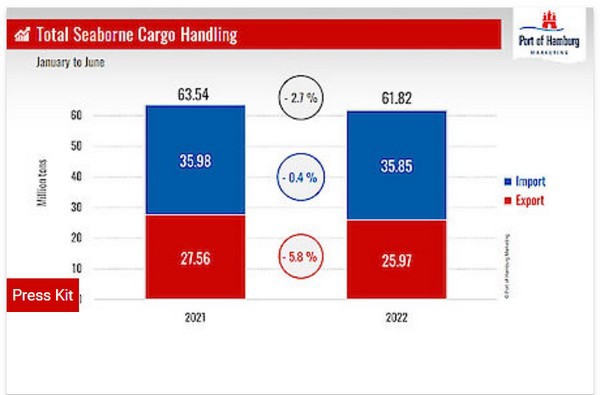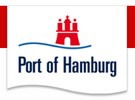The container throughput trend in the Port of Hamburg in the first half of 2022 was more positive than expected. Total throughput of 4.4 million TEU – 20-ft standard containers – in the first six months of the year represented slight growth of 0.9 percent. Compared to the major competing ports of Antwerp-Bruges, Rotterdam and Bremen/Bremerhaven in Northern Europe, all reporting downturns in container handling, Hamburg was the only major port in the range to report an increase. At the four major ports in the European North Range, for the first six months average container throughput fell by 4.6 percent. Against this trend Hamburg, gained 1.1 percentage points, being the only top port to achieve growth in container handling.
At 61.8 million tons, throughput in Germany’s largest universal port was 2.7 percent lower than in the comparable period of the previous year. The drop in the total throughput can be explained by the weaker figure for bulk cargo handling. At 17.6 million tons, handling in Hamburg was down by 8.9 percent. Totals for each of the three segments were lower. At 3.0 million tons, suction cargoes were down by 7.2 percent, at 10.2 million tons, grab cargoes by 3.2 percent, and at 4.5 million tons, liquid cargoes by 20.5 percent. The overall total was partly the result of stiffer EU sanctions against Russia, along with changes dictated by the market in the trading and transport of raw materials.

Many challenges for the Port of Hamburg
“The first half of 2022 confronted companies in the Port of Hamburg, their workers, also all our logistics partners and port customers, with very special challenges. The war in Ukraine, for instance, led to far-reaching sanctions in foreign trade that affected and will further affect seaborne cargo throughput in the Port of Hamburg. Together with the almost complete cessation of container transport with Russian ports, another consequence of the Russian attack on Ukraine – apart from downturns in general cargo handling – was also a steep reduction in bulk cargo handling,” said Axel Mattern, CEO of Port Hamburg Marketing.
Mattern pointed out that not only war in Ukraine, but also the repercussions of the global corona pandemic, will continue to cause transport and supply bottlenecks for trade and industry. On many routes, this is leading to longer transit times and steeply increased freight rates. In Mattern’s view, the main causes of supply chains thrown off schedule, as well as delays and disruption in worldwide transport processes, should not be attributed to ports alone. Instead, it is at the interface between land and sea transport that such factors as shipping bottlenecks and delays in truck and rail traffic are most strikingly visible and notable for port customers and the public.
Click here to read the full press release.
For more information:
Bengt van Beuningen
Port of Hamburg
Tel.: +49 40 37709 102
Ralf Johanning
Tel.: +49 40 37709 113

